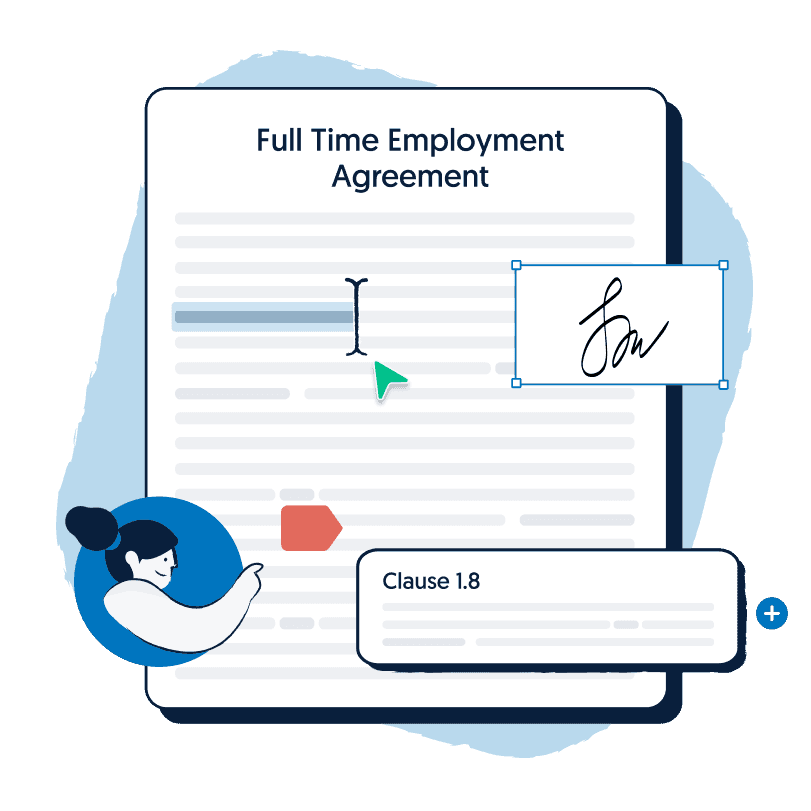As an employer, you may think that arranging electronic funds transfers for every pay cycle is taxing. In fact, it wasn’t too long ago that employees were paid by cheque or cash. In this article, we’ll explain the implications of paying your employees in cash. The short answer is that yes, you can pay your employees in cash. But does that mean you should?
Table of Contents
Wages
The ATO states that all employees have to be remunerated for their services. Wages have to be awarded according to the terms of the employment agreement that both parties agreed. Otherwise, employers must pay employees the minimum amount under the national award. Employers may not pay them in kind, like providing food for services rendered.
Employes may receive their salary in:
- Cash
- Cheque, money order, postal order, etc.
- Electronic fund transfer

Get your Full Time Employment Agreement legal document for free.
The Cash Economy
Paying employees in cash is not uncommon among small businesses. An owner of a cafe or a local grocer may pay their employees from the cash made on the day. It’s easier and more convenient for the small business and the employee gets their wage faster.
The problem with this is that employers can easily avoid paying taxes and superannuation. This can create what is known as the ‘cash economy’, which are transactions occurring outside the tax system. The business does not report its economic activity accurately and appears as though it is making less money than it actually is. As a result, the business ends up paying less tax.
Employer’s Legal Obligations
An employer has to provide a payslip within one working day of paying their employees, no matter how they pay them. The payslip must contain:
- The employee’s name
- The employer’s name and ABN
- The amount of pay before and after tax
- The date of pay
- The pay period
- Superannuation contributions
- If the employee works on an hourly rate, the payslip should reflect the number of hours worked at that rate
- Any bonuses, loadings or penalty rates (and the number of hours worked at those rates)
- Any deductions such as tax or superannuation
Employers must also provide an employee with PAYG (pay as you go) payment summary that outlines your total income for the year and the total amount of tax deducted by the employer. This allows employees to claim any excess tax payments made by the employer.
As an employer, you are also required to report your tax and super information to the ATO every time you pay your employee. If you employee over 20 people, you can do this through the Single Touch Payroll (STP). STP-supporting accounting software will automatically send the relevant payroll information as you pay your employees. From July 2019, this service will be available for businesses that employ less than 20 employees.
Employees
Getting cash-in-hand may also be problematic for employees because there is no record of the employee being paid. In case of a dispute over wages at a later stage, they may have no evidence to prove their claims. Employees also risk accepting a salary that does not accurately reflect the average wages. The current national minimum wage is $719.20 per 38 hour week. You can calculate your minimum rate of pay for your profession using the Fair Work Ombudsman Pay Calculator.
Employee obligations
If you are an employee that gets paid in cash, here are some things you should be aware of.
- Ensure that you receive the correct salary or wage.
- Make sure your employer is making the appropriate tax deductions so you don’t end up paying a hefty amount at the end of the financial year.
- Check that your employer is contributing to your superannuation and that you have worker’s compensation.
- You must receive a payslip reflecting the correct income and deductions when you get paid and PAYG payment summary statement at the end of the financial year.
- You must declare this wage or salary, including tips, as a part of your income when you file your taxes.
Final Thoughts
If paying cash is a more convenient way for you to do business, then there is nothing illegal about it so long as you follow the correct procedure. That being said, there are high chances of providing misleading information to the ATO when you rely on cash payments. It is easier to have everything on record and provide, quick and secure payments to employees through electronic bank transfer. You can also integrate your software with the ATO’s STP and have it send all the relevant information with one touch of a button.
Don’t know where to start? Contact a LawPath consultant on 1800 529 728 to learn more about customising legal documents and obtaining a fixed-fee quote from Australia’s largest legal marketplace.




